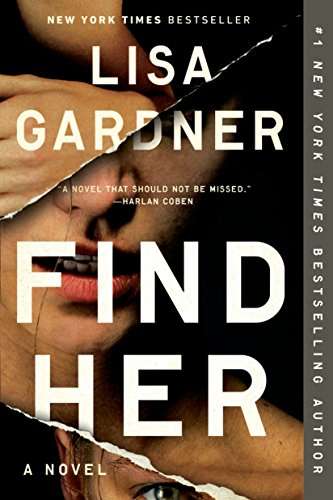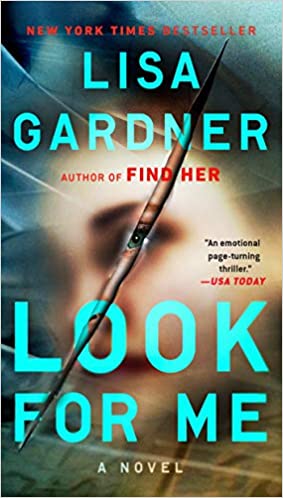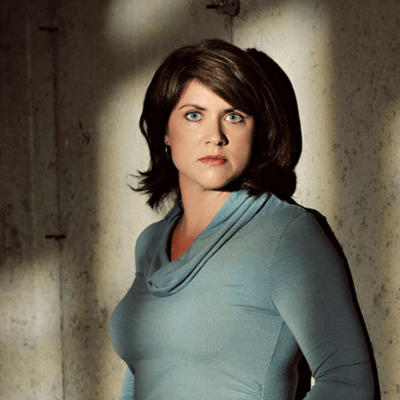Look For Me by Lisa Gardner
This is Part Two of our interview with Lisa Gardner. Click here to read Part One.
 New York Times best selling author Lisa Gardner’s latest novel in the Detective D.D. Warren Series sees the return of not only D.D., but also Flora Dane, the victim-turned-vigilante from Gardner’s previous bestselling novel, Find Her. Now, in Look For Me, D.D. is given a case where an entire family has been murdered, and the teenage daughter, Roxy, is missing. With a ticking clock on how much time is left, D.D. is confronted with one of the most complex cases of her career.
New York Times best selling author Lisa Gardner’s latest novel in the Detective D.D. Warren Series sees the return of not only D.D., but also Flora Dane, the victim-turned-vigilante from Gardner’s previous bestselling novel, Find Her. Now, in Look For Me, D.D. is given a case where an entire family has been murdered, and the teenage daughter, Roxy, is missing. With a ticking clock on how much time is left, D.D. is confronted with one of the most complex cases of her career.
BookTrib got to talk with Lisa Gardner about the research behind her novel, returning to old characters, writing kick-ass women and more.
BookTrib: As a counterpart to D.D., Look For Me sees the return of Flora Dane from Find Her, which I was not expecting! When you were writing Find Her, did you know that Flora was someone you would be bringing back?
LG: Not at all! It’s funny, because that character, our victim-turned-vigilante, clearly struck a chord. And ‘Find Her’ was one of the hardest books to write. It was again inspired by one of these real-life cases where you have women who have been abducted and held – kidnapped for long, long periods of time. More than 10 years and in some cases, more than 20 years. Unfortunately, there is a lot of research material out there.
I think it is a captivating search, that here are people who have gone through the worst and as Flora herself would tell you, that this is supposed to be her happily ever after: she made it out, she survived. So why can’t she feel happy? Why does she still feel so isolated, so dead inside? I think that is just so poignant to all of us trying to feel connected. So, again, they were like, “Can you bring Flora back?”
 I have to admit, I love her as a character. I spend a lot of time now with survivors’ groups and the phrase you hear a lot is “What does it mean to go from a survivor to a thriver?” How do you start defining your own success, because you can’t go back to the person you were. How do you figure out what the new normal is going to be?
I have to admit, I love her as a character. I spend a lot of time now with survivors’ groups and the phrase you hear a lot is “What does it mean to go from a survivor to a thriver?” How do you start defining your own success, because you can’t go back to the person you were. How do you figure out what the new normal is going to be?
I think there’s a lot of story left in Flora, I think this really is a real search. One of the things that she is discovering is that she likes to help others. She can’t be a cop like D.D. is, because she can’t follow rules that well – problems with authority figures – but she is finding a sense of purpose in working with other victims and it’s interesting to give her and D.D. something of a shared goal.
BookTrib: Does this mean that we can expect to see Flora again?
LG: Yes! I am working on next year’s novel, which was also be D.D. and Flora again. This time it’s even more personal, because someone comes forward and it’s directly related to Jacob Ness, who kidnapped Flora. She starts to realize that there might be other survivors out there – she’s never really asked the question of if anyone else survived him.
But it’s funny, because that really is the writing process for me. Like, “Okay, let’s bring this character back, sure, but what can we do that would really mean something to the readers? What’s something that would absolutely, positively be the toughest challenge for Flora?” And that’s looking backwards.
BookTrib: Speaking of D.D. and Flora together, can you tell us briefly about their relationship? They’re very similar in some ways, but they’re also so incredibly different from each other. But the relationship between them is just so dynamic.
LG: This is the fun part of writing for me. I didn’t plan on having Detective D.D. Warren as a series character and I didn’t plan on Flora as a character, let alone to have them together. ‘Look For Me’ really evolved as they evolved. And Flora keeps sticking her nose in things. She’s gotten involved with survivors, she has opinions, she’s following breaking cases in the news; and when a young girl goes missing, in her mind, it’s almost her duty to go find her. For Flora, it will always be personal because of what she went through.
D.D. is a workaholic; she’s obsessed with her job, but she’s also totally exasperated with someone like Flora. Like,”You’re a civilian, stay out.” But she’s also a smart woman who will use the resources she’s given. Flora has more street knowledge, she can do things like interview female gangsters and they’ll talk to her because she’s not a cop. For me, that was something fun to work out – that this could be an advantageous relationship, each of them have something to bring to the table. They both want the same thing, but you’re going to see two very different styles of getting there.
BookTrib: The first time that we see Flora in Look For Me is in the prologue. I don’t want to give too much away, but by the time I finished the prologue I had goosebumps because it was just so gripping. What do you think the key to writing something that puts everyone on edge, and gets inside people’s heads?
LG: I read a lot of Stephen King growing up and he remains my writing hero. He has this ability to capture something truly horrific, but mix it with the mundane. In this case, we open to where this girl Sarah becomes the only survivor of this absolutely horrific crime spree in her apartment – and you can’t just tell someone what happened. If you tell the reader “Oh, something really bad happened and Sarah hasn’t been able to sleep for a year,” it doesn’t mean anything. I do feel like your job as an author is to put yourself in that character’s shoes and make the reader see what she sees and experience what she experiences, which was that she went to bed, it was a normal night, a normal “I’m annoyed with my roommate who brings home strange men,” but then it turns into “Oh my god, what is happening?”
It’s such a dark scene and it’s meant to be terrifying, but what you also get from it is the determination to survive. Her roommates, the fight that they put up and even for her a year later, she has to find a way to move on, to survive with what happened. I liked introducing Flora there, where she shows up saying, “I’m going to teach you how to live again.” Because we don’t want to keep seeing victims being victims – we want to see them making progress. I think in thrillers you can go as dark as you want to go, as long as you show progress. And that brings purpose. It is a violent opening, but it brings a purpose: she’s going to get over this, she’s going to get stronger. And I think people like the ending of the book because you were there for the beginning and you know exactly what this girl has gone through.
BookTrib: Another girl that you have in Look For Me is Roxy. I don’t want to give too much away, but what I did want to touch on is that she wrote these essays about her family and how alcoholism has just destroyed them. There is a brutal honesty to them, but they’re also written so eloquently or poignantly. Can you tell us about writing these essays?
LG: With each book, I trying to learn something new. But I also think, ‘I’ve been at this for 25 years,’ and as a reader, you want to experience something different. In the case of ‘Look For Me,’ I had a neighbor who became a CASA [court-appointed special advocate] volunteer and that was something I had heard of but didn’t really understand. CASA volunteers are advocates for children, usually in foster care, when the family has been ripped apart. If child services is sitting to one side of the court room with the prosecution and the parental unit that’s losing custody because of abuse or alcoholism is sitting on the other side with the defense attorney, the CASA advocate sits in the middle with the children.
In this day and age of the opioid crisis and alcoholism, there are a record number of children in foster care. Even her own biases in the beginning, or the assumptions that all the parent has to do is sober up and the family can get back together, it’s just so much more difficult than that. And for the kids, it’s just brutal. They are helpless in the system, and everyone is trying to tell them it’s for their own good.
Roxy is actually a perfect example of a pretty responsible kid who is taking over for her mom in order to keep the family together. But then the state comes and rips them all apart and says, “This is good for you.” And she’s just like, “No, it’s not.” But I think there’s a real poignancy there too, where families go through crises and you see families ripped apart, and you see families come back together. And, really, the heart of ‘Look For Me’ is the story of this family. They lost each other, the found each other again, and then they were murdered. Now D.D. has 48 hours to figure out what happened. Family is very complicated, let alone understand at all in 48 hours or less.
BookTrib: I keep coming back to this, but just how you wrote the family and the dynamics between them… There’s just such a huge amount of realism throughout every interaction.
LG: I think it helps that I have a teenage daughter, I did have her read those scenes. But with teenagers, they’re just so unflinching in how they look at things. We sugarcoat things, we try to come up with the right words. It was interesting to talk with my neighbor who is with CASA because she said, “The first thing I had to learn was how to talk.” She tried to butter things up, and she would just watch her charges roll their eyes like, “You’re already lying to us we don’t even care anymore.” It calls for that brutal honesty, like, “Your mom is a drunk and that’s why she doesn’t have you anymore.” You have to start interacting at that level, or you weren’t real to them. Because that’s how they see the world; we’re the ones trying to make it seem… not quite how it is, or softened up.
The real question for these kids is “What happens next? What happens to us?” And it’s trying to break things down to those very fundamental levels.
It’s surviving and moving on.
Look For Me: A Novel is now available for purchase. For more information on the author, please visit her website at lisagardner.com
Buy this Book!
Amazon



